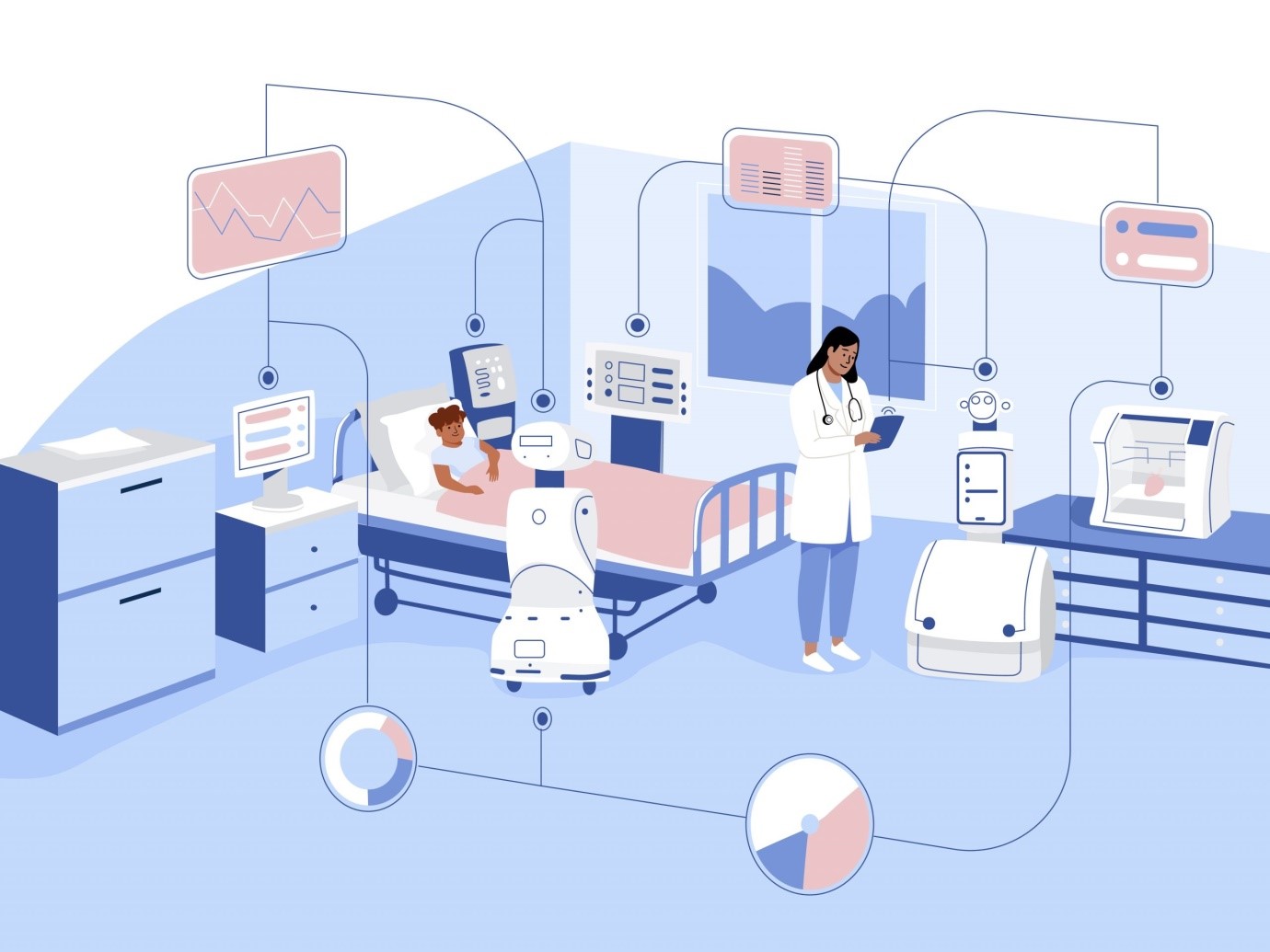The Smart Hospital Market is now assessed at USD 67.9 billion in 2022, with a CAGR of 9.7% between 2023 and 2030.
This report examines the “Smart Hospital Market” in depth using SWOT analysis, which identifies the organization’s strengths, weaknesses, opportunities, and threats. The Smart Hospital Market study also includes an in-depth survey of the market’s main players.
A smart hospital is a healthcare facility that uses modern technology, connection, and data to improve patient care, increase operational efficiency, and provide a better overall experience for both patients and healthcare workers. The concept of a smart hospital entails the integration of numerous technologies to create a linked and intelligent healthcare environment.
Here are some major components and features commonly linked with smart hospitals:
Health Information Technology (HIT):
Smart hospitals use advanced health information systems, electronic health records (EHRs), and other digital tools to securely manage and retain patient information. This promotes effective data sharing among healthcare professionals and improves overall care coordination.
Internet of Things (IoT) Devices:
Connected gadgets, such as wearable health trackers, smart medical equipment, and sensors, are used to monitor patients in real time. These devices can give continuous data on vital signs, activity levels, and other health measures, allowing healthcare providers to track patient health remotely.
Telemedicine and Remote Monitoring:
Telemedicine systems, which allow remote consultations between healthcare providers and patients, are frequently used in smart hospitals. Remote monitoring enables healthcare teams to keep an eye on patients’ health issues without the requirement for constant physical presence.
Automation and Robotics:
Automation and robots can be used in a variety of hospital activities, such as pharmaceutical administration, inventory control, and repetitive jobs. This can increase efficiency, eliminate errors, and allow healthcare workers to concentrate on more difficult areas of patient care.
Artificial Intelligence (AI) and Machine Learning:
AI algorithms can be used for diagnostics, predictive analytics, and personalised treatment plans, among other things. Machine learning algorithms can analyse massive volumes of healthcare data to uncover patterns and trends that can be used to make better decisions.
Patient Engagement Platforms:
Smart hospitals frequently use digital platforms to interact and educate patients. These platforms may include mobile apps, patient portals, and interactive displays within hospitals that deliver information, appointment reminders, and access to personal health records.
Energy Management:
Smart hospitals may use energy-saving technologies to lower their environmental impact and running costs. This can incorporate smart lighting systems, HVAC (heating, ventilation, and air conditioning) controls, and other energy management solutions.
Security and Privacy Measures:
With the rising use of digital technology and interconnected systems, protecting the security and privacy of patient data is critical. Smart hospitals deploy sophisticated cyber security safeguards and adhere to healthcare data protection requirements.
Real-Time Location Systems (RTLS):
RTLS can be used to track the position of equipment, patients, and staff throughout a hospital. This can assist increase workflow efficiency, minimise wait times, and improve patient care.
Smart Infrastructure:
Hospitals’ physical infrastructure may include connected medical devices, smart beds, and other IoT-enabled technology that contributes to a more efficient and patient-centric environment.
Smart Hospital Market Trends:
The Internet of Things (IoT) is transforming healthcare delivery services at an unprecedented rate. Connected medical equipment improve patient safety and efficiency. When such technologies are extended to the entire healthcare organisation ecosystem, the result is a “Smart Hospital.”
Market Segmentation:
The global smart hospital market is divided into five distinct segments: component, connection, technology, application, and distribution channel. Growth among segments allows you to analyse unique pockets of growth and market approaches to establish your primary application areas and the difference in your target markets.
Component:
- Hardware
- Software
- Services
Connectivity:
- Wired
- Wireless
Technology:
- Artificial Intelligence
- Internet Of Things
- Big Data
- Augmented Reality (Ar)
- Cloud Computing
- Others
Application:
- Remote Medicine Management
- Medical Connected Imaging
- Medical Assistance
- Outpatient Vigilance
- Electronic Health Record & Clinical Workflow
- Pharmacy Automation
- Robot-Assisted Surgery
- Virtual Nursing Assistant
- Workflow Assistance
- Administrative Workflow Assistance
- Fraud Detection
- Image Analysis
- Cybersecurity
- Dosage Error Reduction
- Clinical Trial Participant Identifier
- Preliminary Diagnosis
- Connected Machines
- Non-Invasive Diagnosis
- Precision Medicine
- Research
- Others
Geography:
- North America
- Europe
- Asia-Pacific
- Rest of the World
Smart Hospital Market Competitive Landscape:
The Smart Hospital Market is extremely fragmente due to the presence of numerous market participants operating on a global and regional scale. Some market participants in this market category include:
Key Players:
- Koninklijke Philips NV
- GE Healthcare (General Electric)
- Medtronic PLC
- Honeywell Life Care Solutions (Honeywell International Inc.)
- Stanley Healthcare
- SAP SE
- Microsoft Corporation
- Allscripts Healthcare Solutions Inc.
- Cerner Corporation
- McKesson Corporation
- Schneider Electric Healthcare
- ThoughtWire Corp.
Market Drivers:
The demand for smart hospitals is increasing as healthcare infrastructure is modernised.
Technological improvements, higher healthcare spending, sedentary lifestyles, more awareness, and a high acceptance rate of new technologies are driving the worldwide smart hospital market’s growth. In recent decades, the rise in chronic illnesses such as diabetes and cardiovascular disease, particularly in industrialised countries, has substantially boosted demand for healthcare solutions. Furthermore, current advances are propelling the studied market’s expansion. For example, GE Healthcare will open its first 5G innovation lab in July 2022. The lab sought to streamline image transfers and teleradiology by utilising 5G and other smart solutions such as artificial intelligence, augmented and virtual reality, and improved visualisation. It also allowed the company to build connections with diverse organisations.
Download Free PDF Sample @ https://www.datalibraryresearch.com/sample-request/smart-hospital-market-4883
